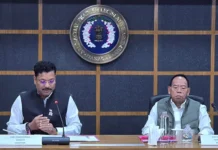[ S Umpo ]
As the Pan Arunachal Joint Steering Committee (PAJSC) sits in dharna with its 13-point charter of demands, the purpose of this article gains significance, in order to try to address certain nuances connected with the ‘null and void’ demand.
The underlying principle in this article is that, wherever there is a right, there is a remedy. And such right must not be jeopardised, no matter how minuscule the number is. The attempt herein therefore is to draw a perspective from legal point of view in relation to the question of declaring the APPSCE null and void.
Suspicion of fraud warrants nullifying selection process?
Appointment/employment to the office of the state, if made in violation of Articles 14 and 16 of the Constitution, would be void and thus can be declared to be nullity. Thus, wherever the arbitrary and discriminatory gained ground, minus equal opportunity, into the selection process, such exams are liable to appropriate action, sometimes nullification. However, declaration of nullity of selection process by the state, only because there was a possibility of corrupt practice, without analysing more on its own, cannot be justified. Suspicion ought not to become substitution of proof. Arbitrary standard to cancel the entirety of the selections with total disregard of relevancies and allowing to be carried away by irrelevancies would amount to jeopardising the principle of proportionality.
It would put the state in parens patriae, with tendency to be biased for its favourite sons. If the state, with machinery to procure relevant records and evidence, gives a go-by to proof, and goes with headcounts, it would peril the foundations of justice system. Therefore, before applying such principles, the foundational facts must be established by the state.
It would not be justified to nullify the exam in totality without arriving at a prior satisfaction on the basis of evidences, which justifies putting the tainted with untainted in the same clothing and being axed together. For, treating the unequal equally would amount to inequality. The state government, therefore, is duty bound to make all endeavours to segregate the tainted from the untainted.
In Benny TD and Ors vs Registrar of Cooperative Societies, there has been tampering of marks in respect of several candidates and therefore it was prayed to annul the entire selection. The court, however, held that the same could not be done as the same would tantamount to gross violation of principles of natural justice which cannot be brushed aside on the ground that public interest demands annulment of the selection. The court thus in Onkar Lal Bajaj and Ors vs Union of India held that to put both the categories, tainted and untainted, at par is wholly unjustified, arbitrary, unconstitutional being violative of Article 14 of the Constitution. Therefore, the primary task is for the state to ascertain the facts of the case and then to take action therewith, based upon such satisfaction arrived at, on the basis of reading of evidence before such authority.
Involvement of a member officer makes others collegiate?
In Inderpreet Singh Kahlon vs State of Punjab, the chairman of the Punjab Public Service Commission was accused of unscrupulous practices, and an amount of around Rs 16 crore was recovered from him. And, on the basis that a case had been initiated against the chairman, the recruitment of selected candidates was cancelled and terminated en masse.
The chairman’s modus operandi involved smuggling the question-and-answer papers, changing the marks awarded, and giving higher marks in viva voce while also reducing those of others, and sometimes handing over blank papers to the aspirants, in order to secure their position through fraud.
Nonetheless, the Supreme Court herein held that it could not be presumed that the decision of the commission was collegiate in nature as one of the members of the commission was biased, resulting into other members also being influenced by him. The court also further stated the en masse termination could only be on the basis of satisfaction arrived on the basis of the evidence so collected and not mere surmises and theories.
Circumstances when non-segregation warrants nullification
Instead of fulfilling the duty and obligation to unearth the alleged malpractice, the state cannot unjustly resort to cancellation en masse by treating the unequal as equals without even prima facie examining any cases. The misdeed of some candidates ought not to affect the honest and the meritorious. The act of governance has to withstand the test of judiciousness and impartiality and avoid arbitrary or capricious actions.
Where the investigating agency is able to segregate the tainted from the untainted, the null and void rule doesn’t arise. However, if the investigating agency establishes that the examination was fraught with large-scale corruption, and that the whole exam process was vitiated, and/but is unable to segregate the tainted from the untainted, then the services of those recruited, even if through merit, would come into jeopardy.
Thus, in the event that segregation is found to be impossible or highly improbable, en masse orders of termination could follow. Therefore the primary obligation rests upon the investigating agency.
APPSCCE conundrum
The above reading therefore entails that it’s the duty of the state to ascertain the facts of the case, and to segregate the meritorious from the tainted. It cannot pave ahead with media-led revealing of corruption without first forming a satisfaction of its own. Now that the investigation agency has been given the onus of unearthing the conspiracy, the ball is in their court for making such segregation. Should the agency come to the conclusion that rampant corruption was pliant in the selection process, but no segregation was possible, then not only the prestige of the investigating agency would be questionable, but also the hard work of the non-tainted would be coloured with the same brush as the tainted.
It is in the interest of the justice system that the investigating agency should unearth those who have occupied the office of the state through unscrupulous arrangements. If investigating agency fails in segregation, the service of the untainted and dedicated officers of state would be at stake, so also the services to the general public.
The investigation ought to be not derailed by undue pressure from the public, nor should it be shrouded in mystery so much so that citizens are unable to ascertain as to whether the agency is progressing to its reasoned conclusion on the basis of evidence so collected or not. In such case, the court may issue continuing mandamus to ascertain the veracity of the investigation progress, looking at the gravity of the issue.
Nonetheless, the agency cannot give every detail of the investigation, for the purpose of the agency is not merely to point fingers at potential tainted officers, but to bring it to conclusion through conviction. Merely bringing tainted officials to the doors of the court and letting them go loose due to lack of evidence would be mere window dressing and causation for failed public delivery of just and fair system. (S Umpo is an assistant professor at Jarbom Gamlin Government Law College, Jote)


